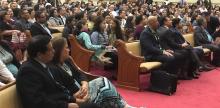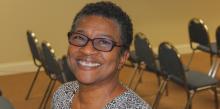For 60 years WGTS 91.9 has served Washington, D.C., and shared Christ. See a timeline of their history here.
1957
WGTS is the first non-commercial radio station to start operating in the Washington, D.C., area.
1960
The station’s power increases from 10 watts to 10,000 watts, and another power increase is completed in the mid-1960s.
1966
WGTS is the first non-commercial radio station to broadcast in stereo in Washington, D.C.
1972
Don Martin, WAU alumnus and current board member, becomes the first full-time manager of the station.
1982
The station starts broadcasting 18 hours a day.




 Historia de Personal de WGTS
Historia de Personal de WGTS

 Read and share these articles from the November 2017 Visitor!
Read and share these articles from the November 2017 Visitor!



